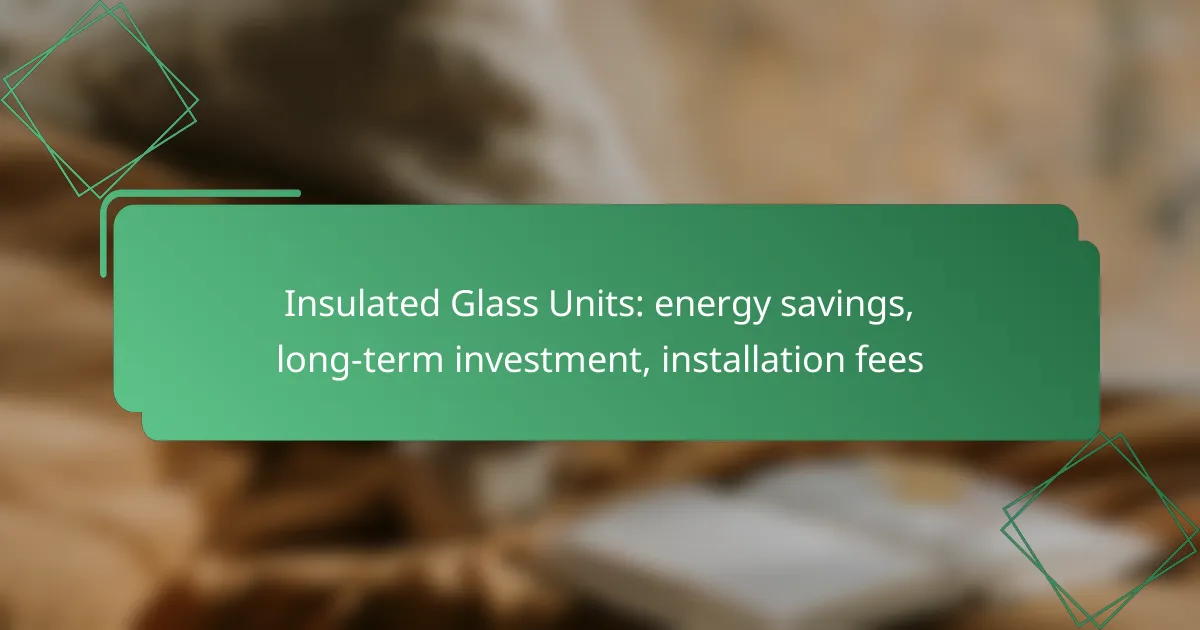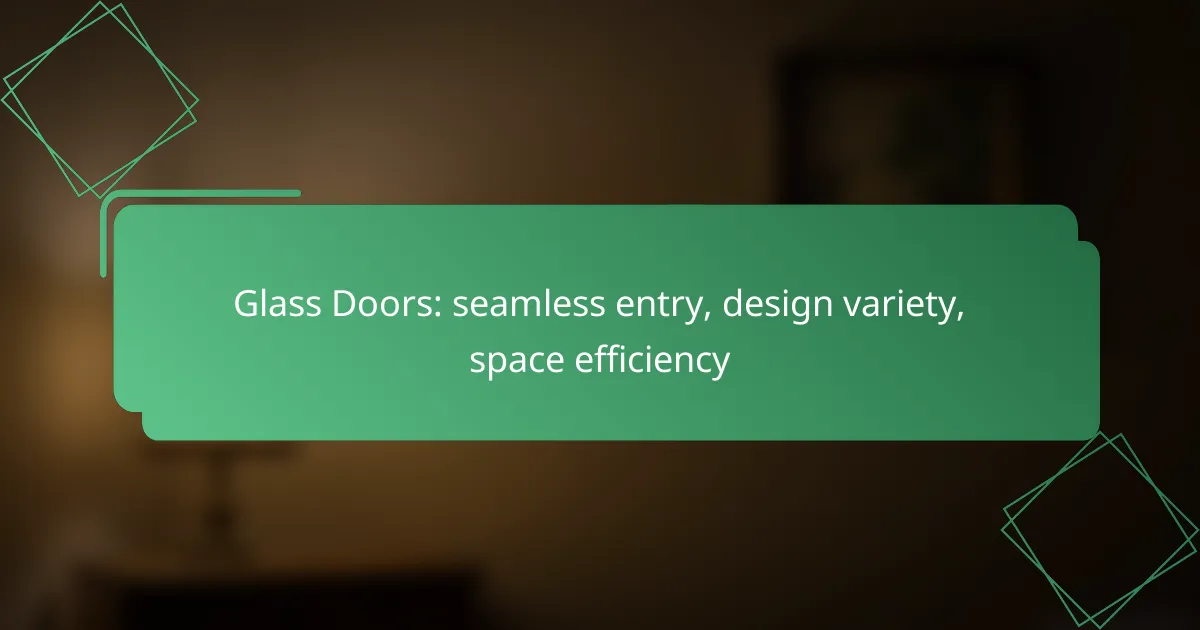Insulated glass units (IGUs) are an effective solution for enhancing energy efficiency in buildings by reducing heat transfer, which leads to significant energy savings. While the initial installation fees can range from CAD 10 to CAD 30 per square foot, the long-term benefits, including lower heating and cooling costs and increased property value, make IGUs a wise investment for homeowners.
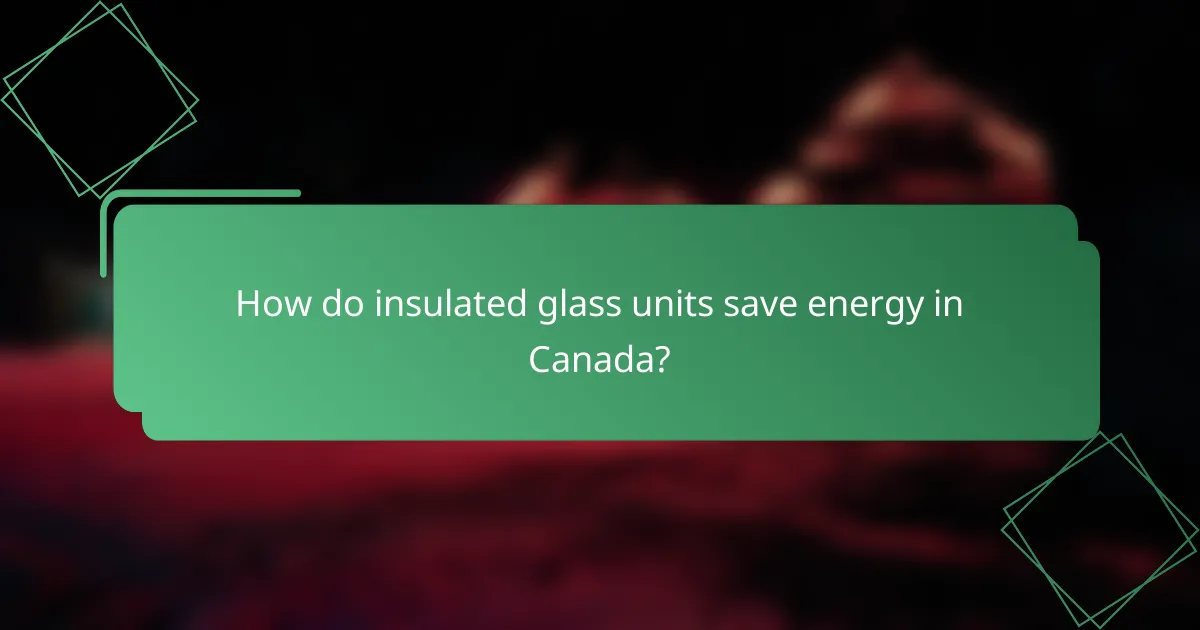
How do insulated glass units save energy in Canada?
Insulated glass units (IGUs) save energy in Canada by minimizing heat transfer between the interior and exterior of buildings. These units consist of multiple glass panes separated by a spacer filled with gas, which enhances thermal performance and reduces energy consumption.
Reduced heat transfer
Insulated glass units significantly reduce heat transfer due to their design. The air or gas between the panes acts as an insulating barrier, slowing down the movement of heat. This means that in winter, less heat escapes from the inside, while in summer, less heat enters, maintaining a stable indoor temperature.
In Canada, where winters can be harsh, using IGUs can lead to substantial energy savings. Homeowners can expect to see a reduction in heat loss by up to 50% compared to single-pane windows, depending on the specific product and installation quality.
Lower heating and cooling costs
By minimizing heat transfer, insulated glass units help lower heating and cooling costs. With reduced energy loss, HVAC systems do not have to work as hard to maintain comfortable indoor temperatures, leading to lower utility bills. In many cases, homeowners can save hundreds of dollars annually on energy expenses.
Investing in IGUs can provide a return on investment over time, as the initial installation costs are often offset by these ongoing savings. In Canada, the average cost of heating and cooling can be significant, making energy-efficient windows a smart financial choice.
Improved indoor comfort
Insulated glass units enhance indoor comfort by maintaining consistent temperatures throughout the home. This reduces drafts and cold spots, making living spaces more enjoyable. Additionally, IGUs help minimize condensation on windows, which can lead to mold and other moisture-related issues.
With improved thermal performance, residents can enjoy a more stable indoor climate year-round. This is particularly beneficial in Canadian climates, where temperature fluctuations can be extreme, ensuring that homes remain cozy in winter and cool in summer.

What are the long-term investment benefits of insulated glass units?
Insulated glass units (IGUs) offer significant long-term investment benefits, primarily through energy savings and increased property value. By reducing heating and cooling costs, these units can lead to substantial financial returns over time.
Increased property value
Installing insulated glass units can enhance the overall value of a property. Homes and commercial buildings equipped with energy-efficient windows are often more attractive to buyers, as they promise lower utility bills and improved comfort.
In many markets, properties with IGUs can command higher sale prices, sometimes reflecting a premium of several percentage points compared to similar properties without such features. This increase in value can be particularly pronounced in energy-conscious regions.
Durability and longevity
Insulated glass units are designed to be durable and long-lasting, often exceeding 20 years of effective performance. Their construction typically includes multiple panes sealed with gas fills, which help prevent condensation and enhance thermal efficiency.
Investing in high-quality IGUs can reduce the frequency of window replacements and maintenance costs, making them a smart choice for long-term property management. Choosing products that meet industry standards, such as those set by the National Fenestration Rating Council (NFRC), can further ensure longevity.
Return on investment analysis
The return on investment (ROI) for insulated glass units can be substantial, with energy savings often recouping initial installation costs within a few years. Homeowners can expect to save anywhere from 10% to 30% on energy bills annually, depending on local climate and energy prices.
When considering installation fees, it is essential to factor in potential rebates or tax incentives that may be available for energy-efficient upgrades. Conducting a simple cost-benefit analysis can help determine the best options for maximizing ROI in your specific situation.
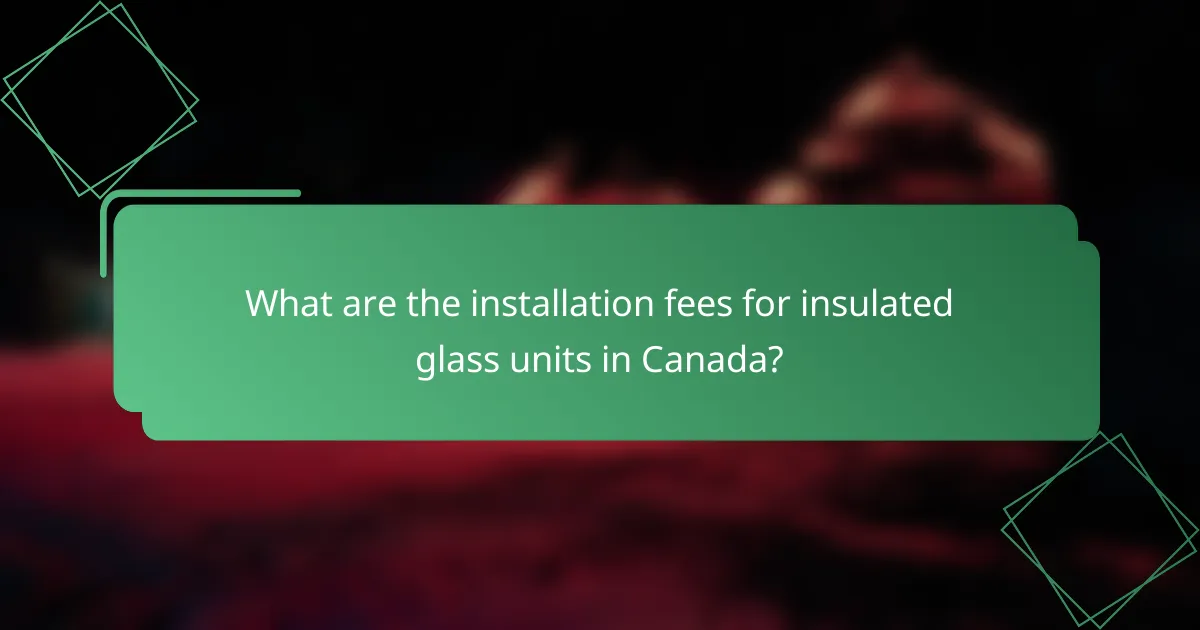
What are the installation fees for insulated glass units in Canada?
The installation fees for insulated glass units in Canada typically range from CAD 10 to CAD 30 per square foot, depending on various factors such as the complexity of the installation and the type of glass used. Homeowners should budget for both the materials and labor when considering this investment.
Average cost per square foot
The average cost per square foot for insulated glass units in Canada generally falls between CAD 10 and CAD 30. This price can vary based on the thickness of the glass, the type of frame, and any additional features like low-emissivity coatings. For larger projects, economies of scale may reduce the per-square-foot cost.
Factors affecting installation fees
Labor costs also vary by region and contractor experience. In urban areas, installation fees may be higher due to increased demand and cost of living. Always obtain multiple quotes to ensure competitive pricing.
Comparative pricing from local contractors
When comparing pricing from local contractors, it’s essential to consider not just the quoted price but also the reputation and experience of the contractor. Some contractors may offer lower initial prices but could lack quality in installation, leading to higher long-term costs.
Requesting detailed estimates that break down materials, labor, and any additional fees can help in making an informed decision. Online reviews and referrals can also provide insights into the reliability and quality of service from different contractors in your area.
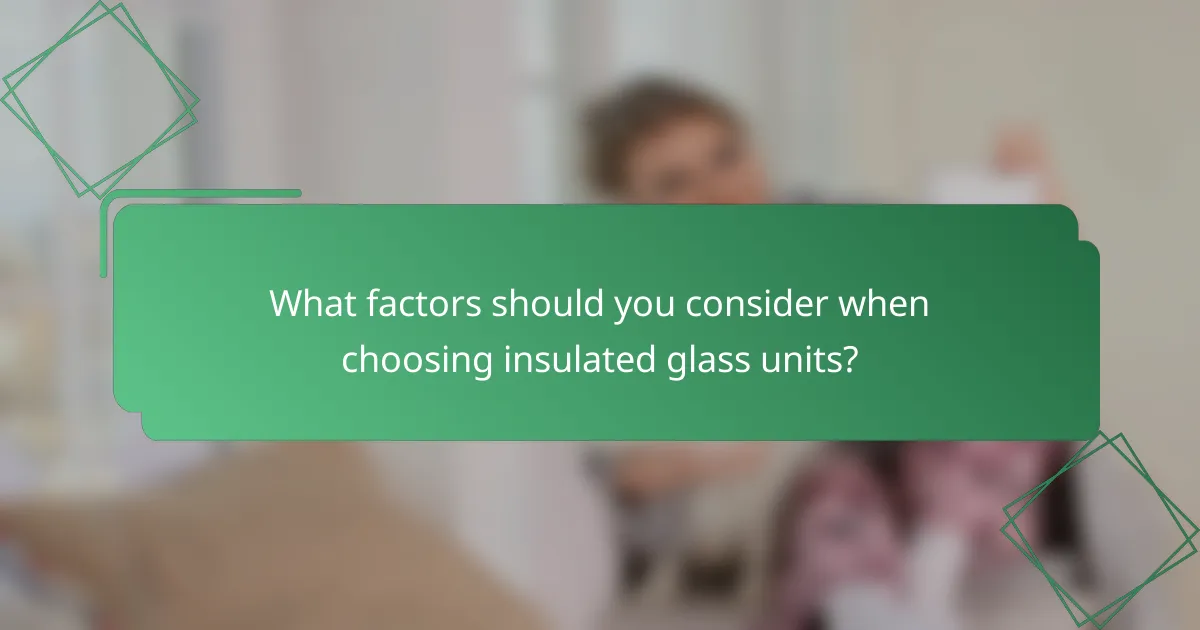
What factors should you consider when choosing insulated glass units?
When selecting insulated glass units, consider energy efficiency, frame materials, and local climate. These factors significantly influence performance, cost, and long-term savings.
Energy efficiency ratings
Energy efficiency ratings indicate how well insulated glass units can reduce heat transfer. Look for units with a low U-factor, which measures thermal conductivity; lower values mean better insulation. Additionally, consider the Solar Heat Gain Coefficient (SHGC) to assess how much solar heat is allowed through the glass.
Units with Energy Star certification often meet high efficiency standards, making them a reliable choice for energy savings. Depending on your location, selecting units with ratings that exceed local building codes can lead to further savings on heating and cooling costs.
Frame materials
The choice of frame materials impacts both the durability and thermal performance of insulated glass units. Common materials include vinyl, wood, aluminum, and fiberglass, each with distinct advantages. Vinyl frames offer excellent insulation and low maintenance, while wood provides aesthetic appeal but requires more upkeep.
Consider the climate when selecting frame materials; for instance, aluminum frames may conduct heat more than other materials, making them less suitable for extreme temperatures unless they have thermal breaks. Balancing aesthetics, cost, and performance is key to making the right choice.
Local climate considerations
Your local climate plays a crucial role in the effectiveness of insulated glass units. In colder regions, prioritize units with higher insulation values to retain heat, while in warmer climates, focus on those with low SHGC to minimize cooling costs. Understanding your area’s temperature fluctuations can guide your selection.
Additionally, consider local weather patterns, such as humidity and precipitation, which can affect frame materials and sealant longevity. Consulting with local building codes and energy efficiency programs can provide insights into the best options for your specific environment.
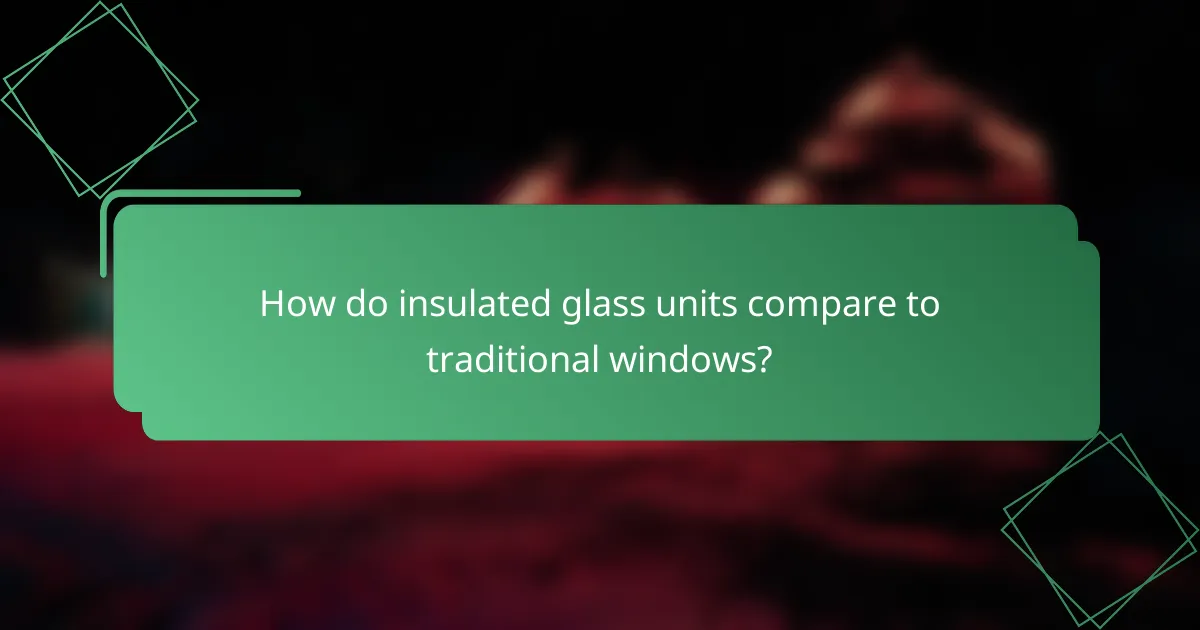
How do insulated glass units compare to traditional windows?
Insulated glass units (IGUs) offer superior energy efficiency compared to traditional windows, significantly reducing heating and cooling costs. These units consist of multiple glass panes separated by a space filled with gas, which minimizes heat transfer and enhances comfort.
Energy performance differences
Insulated glass units excel in energy performance by providing better thermal insulation than single-pane or even double-pane traditional windows. They typically feature low-emissivity (Low-E) coatings that reflect heat back into the room during winter and block it during summer, leading to energy savings of around 20-30% on heating and cooling bills.
In colder climates, IGUs can help maintain a more stable indoor temperature, while in warmer regions, they reduce the need for air conditioning. This efficiency can contribute to a smaller carbon footprint, aligning with energy conservation goals.
Cost-benefit analysis
While the initial installation cost of insulated glass units can be higher than traditional windows, the long-term savings on energy bills often justify the investment. Homeowners may pay a few hundred to over a thousand dollars more per window, but the reduction in energy costs can lead to a return on investment within several years.
Additionally, some regions offer incentives or rebates for energy-efficient upgrades, further enhancing the financial benefits. It’s essential to evaluate local energy prices and potential savings to determine the best choice for your home.
Maintenance requirements
Insulated glass units generally require less maintenance than traditional windows due to their durability and resistance to condensation. The sealed design prevents moisture buildup between panes, which is a common issue with single-pane windows.
However, regular cleaning of the exterior surfaces is necessary to maintain optimal performance and aesthetics. Homeowners should also inspect seals periodically for any signs of failure, which can compromise energy efficiency and may require professional repair or replacement.

What are the latest trends in insulated glass technology?
Recent advancements in insulated glass technology focus on enhancing energy efficiency and improving user comfort. Innovations such as low-emissivity coatings and gas fills are becoming standard, helping to reduce energy consumption in residential and commercial buildings.
Smart glass innovations
Smart glass technology allows for dynamic control of light and heat entering a space, significantly improving energy savings. This type of glass can change its properties in response to environmental conditions, such as temperature and sunlight, providing optimal comfort and reducing reliance on heating and cooling systems.
Examples of smart glass include electrochromic and thermochromic options, which can adjust their tint based on electrical signals or temperature changes, respectively. These innovations can lead to energy savings of up to 30% in some cases, making them a worthwhile investment for energy-conscious consumers.
When considering smart glass, evaluate the installation costs against potential energy savings. While initial expenses may be higher than traditional insulated glass units, the long-term benefits often justify the investment, especially in climates with extreme temperatures.






